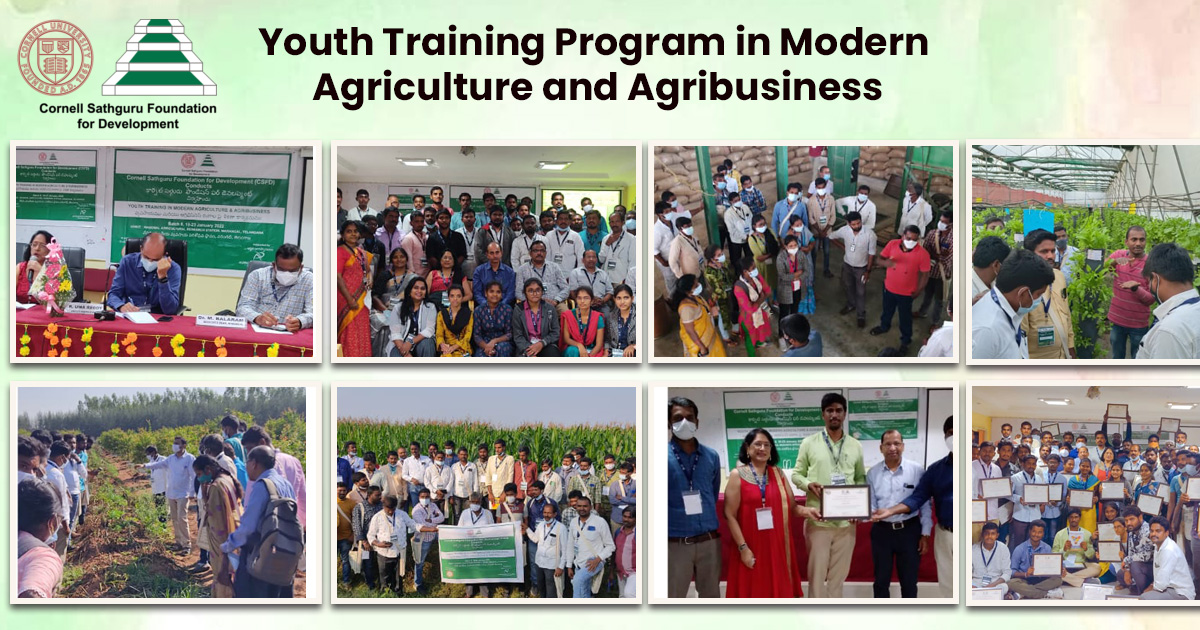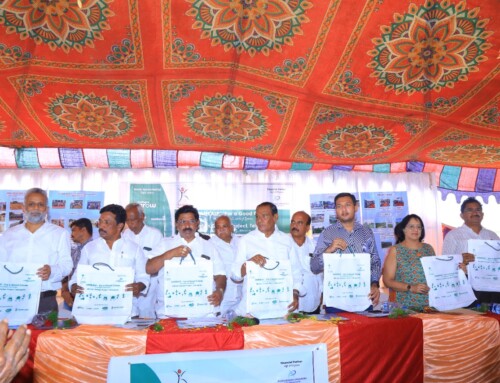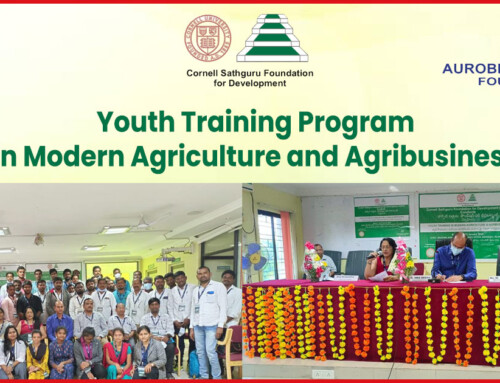Facilitating youth to see agriculture more profitably has been one of the critical commitments of Cornell Sathguru Foundation for Development (CSFD) since 2002. To this end, CSFD has developed a comprehensive capacity-building model that can help youth to change mindsets towards agriculture and explore pathways to profitable & sustainable agriculture and livelihoods. In the past, CSFD has conducted several training programs for rural youth and progressive farmers in Telangana.
Vijay Kumar Nayak expressed, “Scientists from PJTSAU, KVK Mamnoor has very well explained about farm implements, mushroom cultivation, seed production, pulses production and high-density method in cotton. Visits to KVK Mamnoor, COE Mulugu & Jeedimetla, and Mulkanoor dairy are very resourceful.”
In continuation to the efforts, CSFD has recently concluded a residential capacity building program for 50 rural young farmers from Warangal district, Telangana. The program’s key objective is to enhance the capacities of marginalized young farmers’ to explore agriculture profitably. To this end, CSFD has designed the sessions as per their local cropping patterns and socioeconomic conditions. CSFD has conducted this 5-day experiential learning program in agriculture, horticulture, animal husbandry, and agribusiness collaboration with Professor Jayashankar Telangana State Agricultural University (PJTSAU) during 18-22 Jan 2022 at Regional Agricultural Research Station (RARS), Warangal. Along with classroom sessions, as part of exposure trips, youth have visited Krishi Vignan Kendra (KVK), the seed processing unit, the center of excellence (COE) for fruits and vegetables, and the Mulkanoor daily cooperative.
Thanking CSFD, Saritha, a participant, mentioned, “This training program helps youth farmers learn modern techniques in agriculture and allied sectors. These type of training programs helps youth to build confidence and hope in the sector, thereby discouraging them from migrating to cities for menial jobs.”
Post the program, youth opined that insightful sessions on mushroom cultivation, sericulture, apiculture helped them dive deep into allied sectors and explore possible economic opportunities leveraging agriculture. They mentioned that learning about the latest advancements in agriculture has helped them understand to mitigate climate change and adopt resilient agricultural practices, which can help to improve their productivity, thereby, incomes.
The youth felt that the program had laid a pathway for rich peer learning, and the effective exchange of knowledge helped them learn new and profitable agricultural practices. Also, trained cadres were confident that they could disseminate the knowledge and techniques to their fellow farmers in the villages. On average, we estimate that each trained youth would disseminate and share knowledge with at least 20 other rural youth in their villages, leading to a strong spillover effect of reaching more than 1000 farmers in Warangal. The ripple effect will increase a more skilled workforce and improve the opportunities for farmers in agriculture, focus on value-added products, agri-enterprises and earn additional incomes through allied sectors. More importantly, CSFD’s comprehensive capacity-building model aligns perfectly with the national agenda of “Attracting and Retaining of Youth in Agriculture (ARYA) and achieving the national targets set for youth and agriculture.
Ravi Prasad, a participant, opined that “the training is very resourceful. However, for deeper understanding of the concepts, it would be great if the training could be a little longer for about 10-15 days.”
Author:

Raja Rajeswari
Associate Vice President – Development




